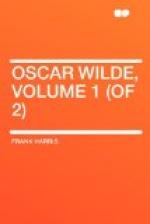Suddenly the loud voice of the clerk called for silence.
As the judge appeared everyone stood up and in complete stillness Sir Edward Clarke opened for the prosecution. The bleak face, long upper lip and severe side whiskers made the little man look exactly like a nonconformist parson of the old days, but his tone and manner were modern—quiet and conversational. The charge, he said, was that the defendant had published a false and malicious libel against Mr. Oscar Wilde. The libel was in the form of a card which Lord Queensberry had left at a club to which Mr. Oscar Wilde belonged: it could not be justified unless the statements written on the card were true. It would, however, have been possible to have excused the card by a strong feeling, a mistaken feeling, on the part of a father, but the plea which the defendant had brought before the Court raised graver issues. He said that the statement was true and was made for the public benefit. There were besides a series of accusations in the plea (everyone held his breath), mentioning names of persons, and it was said with regard to these persons that Mr. Wilde had solicited them to commit a grave offence and that he had been guilty with each and all of them of indecent practices....” My heart seemed to stop. My worst forebodings were more than justified. Vaguely I heard Clarke’s voice, “grave responsibility ... serious allegations ... credible witnesses ... Mr. Oscar Wilde was the son of Sir William Wilde ...” the voice droned on and I awoke to feverish clearness of brain. Queensberry had turned the defence into a prosecution. Why had he taken the risk? Who had given him the new and precise information? I felt that there was nothing before Oscar but ruin absolute. Could anything be done? Even now he could go abroad—even now. I resolved once more to try and induce him to fly.
My interest turned from these passionate imaginings to the actual. Would Sir Edward Clarke fight the case as it should be fought? He had begun to tell of the friendship between Oscar Wilde and Lord Alfred Douglas; the friendship too between Oscar Wilde and Lady Queensberry, who on her own petition had been divorced from the Marquis; would he go on to paint the terrible ill-feeling that existed between Lord Alfred Douglas and his father, and show how Oscar had been dragged into the bitter family squabble? To the legal mind this had but little to do with the case.
We got, instead, a dry relation of the facts which have already been set forth in this history. Wright, the porter of the Albemarle Club, was called to say that Lord Queensberry had handed him the card produced. Witness had looked at the card; did not understand it; but put it in an envelope and gave it to Mr. Wilde.
Mr. Oscar Wilde was then called and went into the witness box. He looked a little grave but was composed and serious. Sir Edward Clarke took him briefly through the incidents of his life: his successes at school and the University; the attempts made to blackmail him, the insults of Lord Queensberry, and then directed his attention to the allegations in the plea impugning his conduct with different persons. Mr. Oscar Wilde declared that there was no truth in any of these statements. Hereupon Sir Edward Clarke sat down. Mr. Carson rose and the death duel began.




